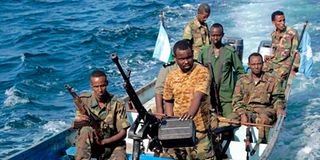The UAE now drawn into Somalia divisive politics

Somali coast guard personnel patrol the waters of Bossaso in Puntland. Influential elders in the region want the UAE company running Bossaso port to leave, saying it has not done anything for residents. Bossaso is Somalia’s export hub.
The role of Gulf countries in Somalia has been debatable for years. Some politicians side with the United Arab Emirates and others with Qatar.
Just days ago, clan elders in Bossaso, Puntland state, raised a new storm by demanding that an Emirati company running the local port leaves.
Supreme traditional leader Boqor Burhan Boqor Muuse and his team said their wish is to see DP World leave.
“DP World has done nothing in the last five years it has been in Puntland,” the elders said.
The logistics firm did not respond to a Sunday Nation inquiry on the elders’ stance.
It is generally understood that the Puntland administration of President Said Abdullahi is close to the United Arab Emirates, and hence DP World.
When it won the contract five years ago, some politicians demanded that it be cancelled for violating Somalia’s sovereignty.
The deal survived largely because the provisional constitution of Somalia allows states to have some autonomous arrangements with foreign entities.
The port is just one area the role of the UAE manifests.
With the country struggling with an election timeline, there is talk of Abu Dhabi being viewed in political lenses.
Early this month, President Mohamed Abdullahi Farmaajo and Prime Minister Hussein Roble disagreed over releasing money belonging to the UAE seized four years ago.
Farmaajo publicly opposed an apology and decision by his PM to release the $9.6 million in cash impounded on April 8, 2018.
It had been shipped in from Abu Dhabi by the UAE government, ostensibly to pay Somali National Army soldiers.
It is not known how many soldiers were to be paid and whether there had been a formal agreement for the arrangement.
Security officials seized the money as soon as it landed via a chartered flight at Aden Adde airport, Mogadishu.
Government officials said the money was brought in to destabilise the country, though they did not give the intended recipient.
Roble issued an apology to the UAE ambassador on Friday. He timed it to the occasion of receiving food aid from the UAE meant for drought-stricken regions.
“It is a new dawn of normalising relations,” Roble’s spokesman Mohammed Moalimu said.
“Somalia and the UAE are on a progressive path to end their differences and resume brotherly ties. Roble says Somalia will return the money seized in 2018.”
Hours later, Villa Somalia, the President’s residence, said the cash would not be released.
The letter addressed to the central bank governor and copied to state agencies, including the Financial Reporting Centre and Roble, said the money reached the country illegally “and should not be released in an illegitimate manner”.
“The illegal entry of this undeclared money into our republic posed a threat to national security and the stability of our financial systems,” Farmaajo said in the letter.
“The suspicious movement of this illicit money, whose transfer also abused international remittance laws and our national financial regulations, caused its placement under the Central Bank of Somalia.”
When the cash was intercepted, the UAE embassy said it was meant for salaries of a military unit stationed in Mogadishu run by the UAE.
The Roble-Farmaajo tussle also shows weaknesses in the country’s institutions.
Dr Mustafa Y. Ali of the Horn International Institute of Strategic Studies said the country may be wasting time needed to build agencies to avoid future rows.






